Filter by
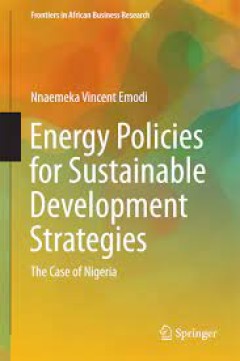
Energy Policies for Sustainable Development Strategies the Case of Nigeria
In this book, a number of long-term energy scenarios are developed for Nigeria considering the impact of vital factors that may influence energy policies in the country’s future energy system. The energy scenarios were developed through the Long-Range Energy Alternatives Planning System (LEAP) model. The model identified the future energy demand and supply pattern using a least-cost combinati…
- Edition
- 1
- ISBN/ISSN
- 978-981-10-0974-7
- Collation
- 85 b/w illustrations
- Series Title
- -
- Call Number
- -

The Spiritual Dimension of Business Ethics and Sustainability Management
This book discloses the spiritual dimension in business ethics and sustainability management. Spirituality is understood as a multiform search for meaning which connects people with all living beings and God or Ultimate Reality. In this sense, spirituality is a vital source in social and economic life. The volume examines the spiritual orientations to nature and business in different cultural t…
- Edition
- 1
- ISBN/ISSN
- 978-3-319-11677-8
- Collation
- -
- Series Title
- -
- Call Number
- -
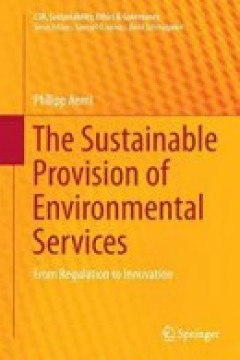
The Sustainable Provision of Environmental Services from Regulation to Inno…
This book addresses the ability of market-based instruments to improve the sustainable provision of environmental services. The author combines field research and insights from the multi-stakeholder dialogue at the FAO to analyze the gap between the predictions provided by theory and the corresponding outcomes in practice. In particular, the author challenges the theory behind Payments for Envi…
- Edition
- 2
- ISBN/ISSN
- 978-3-319-19345-8
- Collation
- -
- Series Title
- -
- Call Number
- -

Rethinking environmentalism :linking justice, sustainability, and diversity
A multidisciplinary examination of alternative framings of environmental problems, with using examples from forest, water, energy, and urban sectors. Does being an environmentalist mean caring about wild nature Or is environmentalism synonymous with concern for future human well-being, or about a fair apportionment of access to the earth's resources and a fair sharing of pollution burdens Envir…
- Edition
- -
- ISBN/ISSN
- 9780262349925
- Collation
- 1 online resource (302 pages).
- Series Title
- -
- Call Number
- -

Balancing Green :When to Embrace Sustainability in a Business (and When Not To)
An expert on business strategy offers a pragmatic take on how businesses of all sizes balance the competing demands of profitability and employment with sustainability.OCLC-licensed vendor bibliographic record.
- Edition
- -
- ISBN/ISSN
- 9780262345750
- Collation
- 1 online resource
- Series Title
- -
- Call Number
- -
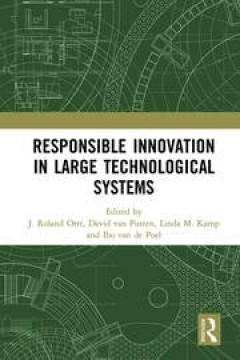
Responsible Innovation in Large Technological Systems
Large technological systems, such as seaports, nuclear power stations, wind farms and natural gas extraction, provide vital functions for society. And yet these large technological systems have an impact on different stakeholder groups in both positive and negative ways. This book defines responsible innovation and describes how both the innovation process and the resulting innovation outcom…
- Edition
- -
- ISBN/ISSN
- -
- Collation
- -
- Series Title
- -
- Call Number
- -
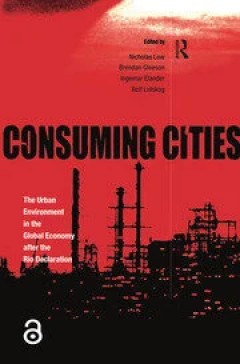
Consuming Cities
This book is about cities as engines of consumption of the world's environment, and the spread of policies to reduce their impact. It looks at these issues by examining the impact of the Rio Declaration and assesses the extent to which it has made a difference. Consuming Cities examines this impact using case studies from around the world including: the USA, Japan, Germany, the UK, China, Indi…
- Edition
- -
- ISBN/ISSN
- -
- Collation
- -
- Series Title
- -
- Call Number
- -

"Human Minds and Animal Stories "
The power of stories to raise our concern for animals has been postulated throughout history by countless scholars, activists, and writers, including such greats as Thomas Hardy and Leo Tolstoy. This is the first book to investigate that power and explain the psychological and cultural mechanisms behind it. It does so by presenting the results of an experimental project that involved thousands …
- Edition
- -
- ISBN/ISSN
- -
- Collation
- -
- Series Title
- -
- Call Number
- -
Structural and Chemical Analysis of New Cement Based on Eggshells and Sand fr…
- Edition
- -
- ISBN/ISSN
- 978-1-83881-956-9
- Collation
- -
- Series Title
- -
- Call Number
- -
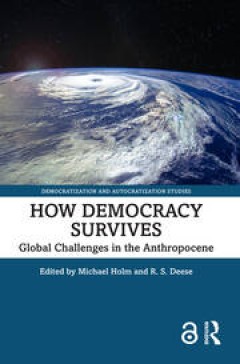
How Democracy Survives
ABSTRACT How Democracy Survives explores how liberal democracy can better adapt to the planetary challenges of our time by evolving beyond the Westphalian paradigm of the nation state. The authors bring perspectives from Africa, Asia, Europe, Latin America, and North America, their chapters engaging with the concept of transnational democracy by tracing its development in the past, assessin…
- Edition
- -
- ISBN/ISSN
- 9781003218586
- Collation
- -
- Series Title
- -
- Call Number
- -
 Computer Science, Information & General Works
Computer Science, Information & General Works  Philosophy & Psychology
Philosophy & Psychology  Religion
Religion  Social Sciences
Social Sciences  Language
Language  Pure Science
Pure Science  Applied Sciences
Applied Sciences  Art & Recreation
Art & Recreation  Literature
Literature  History & Geography
History & Geography